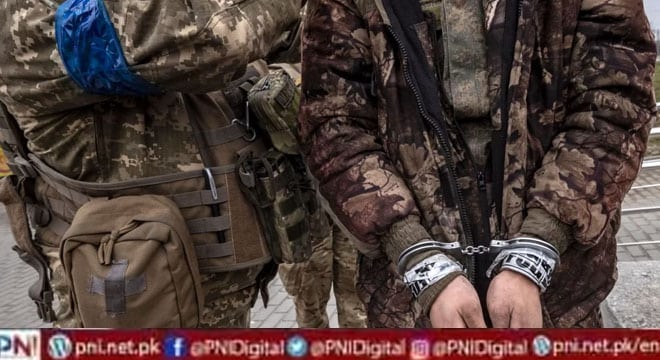Geneva, Nov 15 (AFP/APP):Prisoners held by both sides in Russia’s war in Ukraine have been subjected to torture, including with beatings, electric shocks, and humiliating treatment while naked, UN investigators said Tuesday.
Under international law, “the prohibition of torture and ill-treatment is absolute, even — indeed especially — in times of armed conflict,” Matilda Bogner, head of the UN Rights Monitoring Mission, told reporters.
She lamented that neither side in the war raging in Ukraine appeared to be adhering fully to that principle, although the ill-treatment of Ukrainian prisoners of war by Russian captors was more “systematic”.
Speaking via video link from Kyiv, she said the team of investigators, which has been present in Ukraine since 2014, had in recent months interviewed 159 prisoners of war — all but 20 men — held by Russia, and 175 prisoners — all men — held by Ukraine.
While Ukraine gave access to the prisoners while in detention, Russia did not, and the Ukrainian prisoners of war could only be interviewed after their release, she said.
– Mock executions –
The “vast majority” of Ukrainian prisoners held by Russia described torture and ill-treatment, Bogner said.
The investigators determined that some were beaten immediately upon capture and had their belongings pillaged, while many were then transported on overcrowded trucks or buses, sometimes lacking access to water or toilets for more than a day.
“Their hands were tied and eyes covered so tightly with duct tape that it left wounds on their wrists and faces,” Bogner said.
Upon arrival at some of the places of internment, the prisoners were then subjected to so-called “admission procedures”, she said, including prolonged beatings, threats, dog attacks, being stripped and put into stress positions.
Once in internment, most said they were subjected to torture.
“Torture and ill-treatment were not only used to coerce prisoners of war to give military information,” Bogner said. “They were, interviewees said, used on a daily basis to intimidate and humiliate them.”
The investigators heard from former prisoners of war that they had been beaten, including with batons and wooden hammers, kicked and given electric shocks with tasers and a military phone known as TAPik.
Bogner quoted one man who was held in a penal colony near the eastern town of Olenivka and who told the investigators that members of Russian-affiliated armed groups had “attached wires to my genitalia and nose, and shocked me”.
Others described being stabbed, shot with a stun gun, threatened with mock executions, being hung by the hands and legs, and burned with cigarettes.
“We also documented various forms of sexual violence, such as pulling a male victim by a rope tied around his genitalia, or forced nudity combined with the threat of rape,” Bogner said.
– Electric shocks –
The investigators did not describe similar sexual violence against the Russians held by the Ukrainians, but did say many had described “poor and often humiliating conditions during transit to camps and internment centres”.
“Often naked, they were packed into trucks or minivans, with their hands tied behind their backs,” Bogner said.
Investigators interviewing the Russian prisoners of war also received “credible allegations of summary executions of persons hors de combat,” she said.
They had also heard of “several cases of torture and ill-treatment, reportedly committed by members of the Ukrainian armed forces,” she added.
The prisoners of war had described being punched and kicked in the face and body after surrendering and when they were interrogated.
“In several cases, prisoners of war were stabbed or given electric shocks with the ‘TAPik’ military phone by Ukrainian law enforcement officers or military personnel guarding them,” Bogner said.
She highlighted the need for accountability for such abuse, and hailed that Ukraine had launched a number of criminal investigations targeting members of its armed forces accused of abuse against prisoners.
Follow the PNI Facebook page for the latest news and updates.








